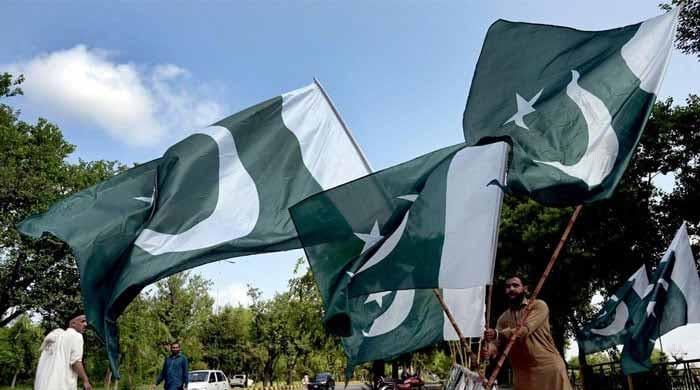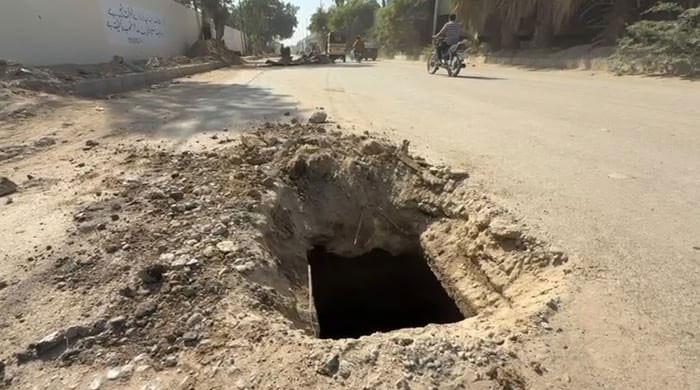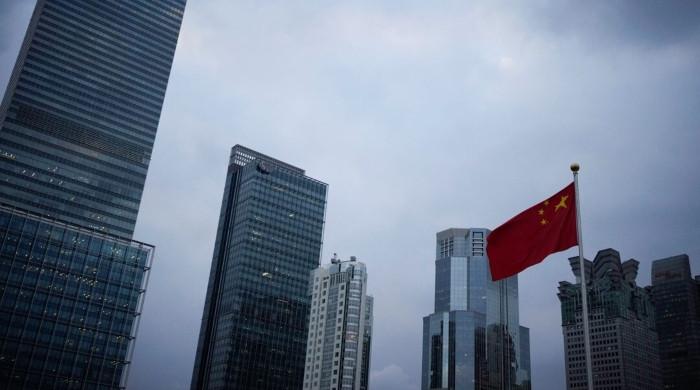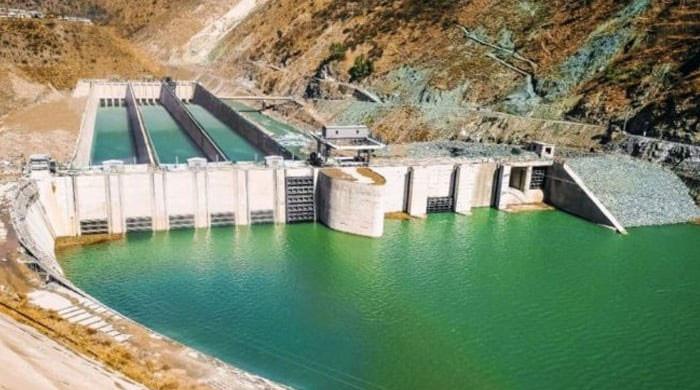Maulana Fazlur Rehman’s style of politics
Fazl's demands of PM’s resignation and fresh elections looks not only unreasonable but also undemocratic and in haste
November 08, 2019
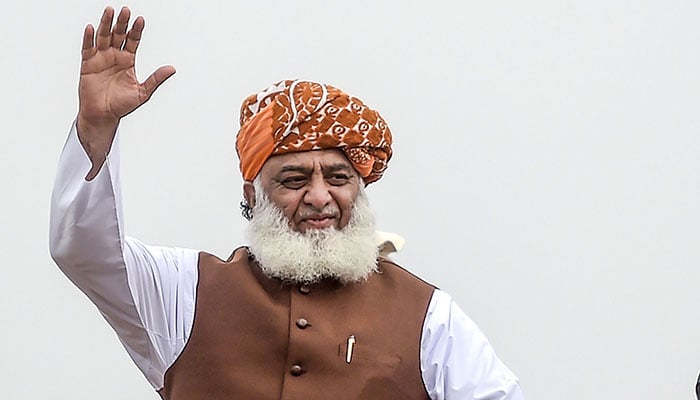
Unlike many politicians in Pakistan, Maulana Fazlur Rehman is not the product of any ‘military dictator’ but of madrassa Darul Uloom Haqania in Akhora Khattak, and was junior to Afghan Taliban leader the late Mullah Mohammad Omar; both, students of the late Maulana Samiul Haq.
In the last 39 years since he became the Ameer of Jamiat Ulema-e-Islam (JUI), in 1980, Maulana’s style of politics has confused both rightists and liberals. As today he is facing one of his toughest challenges to oust his arch political rival, a man from Mianwali and now the prime minister, Imran Khan. Maulana’s recent Azadi March to Islamabad will bear any result or not, the fact remains that he has emerged as the central political figure ahead of the Pakistan Peoples Party (PPP) and the Pakistan Muslim League-Nawaz (PML-N).
His demands of PM’s resignation and fresh elections apparently looked not only unreasonable but also undemocratic and in haste. Yet he is there with strong crowd of his followers and efforts were under way to end the crisis without confrontation. What is Maulana’s dilemma today, perhaps he had never thought that a man who hardly knows politics and was a cricket star, when he became the Ameer in 1980, not only ousted him from his own constituency but is now the prime minister of Pakistan. Imran Khan joined politics 16 years after Maulana, and his party the PTI is in power in Khyber Pakhtunkhwa since 2013.
Imran’s popularity in the KP was not only because of his charisma as cricketing hero of 1992 World Cup but also because of his consistent stance against the military operation in the tribal areas. He has challenged Maulana both on the Afghan front as well as on the religious front. However, even Imran was never expecting that Maulana would be able to bring such a huge crowd of followers to Islamabad. He is facing a dilemma in resolving the present crisis despite army’s decision to side with the ‘elected government’.
In the last 10 years, Imran has emerged as Maulana’s biggest and toughest challenger and the latter knows that if he failed in getting anything out of his Azadi March’ it would not be easy for him to return to parliament. However, unlike other opposition parties, Maulana had rejected the results of 2018 elections and was disappointed when the PPP and the PML-N rejected his plea not to take oath. As a consequence, he too allowed his elected members to take oath.
Maulana made his political debut in the Movement for Restoration of Democracy (MRD) an alliance formed against former military dictator late General Ziaul Haq in 1981, just a year after he became Ameer of the JUI, after the death of his father and former chief minister of the then NWFP (now KP) in 1980. For the first time he was arrested during 1983 MRD movement.
According to one of JUI’s veteran, it was Maulana Sirajuddin Pur, who was first made Ameer of the JUI after Maulana Mufti Mahmood’s death but because of his rigid stance on certain matters within the party and on politics, the JUI shoora replaced him with Maulana Fazlur Rehman as Ameer at a very young age of 26.
Had JUI-F joined Gen Zia’s Majlis-e-Shoora or cabinet, Maulana would have been branded as the product of martial law or General Zia, but thanks to his father’s decision of not joining General Zia and only supported elections in 90 days. Maulana never faced criticism for supporting a dictator. On the contrary, his political career started from the opposition’s platform.
After assuming the office of party’s ameer, he faced the first challenge when his party was invited to join MRD in its first initial meeting held at the conference room of the Karachi Press Club, chaired by Begum Nusrat Bhutto. Initially, he was reluctant as his father was opposed to Zulfikar Ali Bhutto and also his party was part of PNA, which launched the movement against Bhutto. He faced tough challenge within the JUI over the question of accepting ‘woman as prime minister’ during the 1988 elections, which all the component parties of the MRD, contested from their respective platforms. However, Maulana refused former ISI chief late General Hameed Gul’s request to join Islami Jamoohri Ittehad (IJI) for defeating Benazir Bhutto’s PPP, which was set to sweep polls. Maulana told Gul “we have not yet decided over supporting BB as premier, but no one could deny the fact that she was the leader of a popular party, which could win the polls”.
Maulana cleverly managed opposition within the JUI over accepting woman as PM, and because of his firm control over the party, the decision was taken unanimously by JUI Central Shoora and was never reversed. He always had a working relationship with the PPP under Benazir till her assassination in 2007.
While Benazir always respected Maulana and his political acumen, it was her spouse and former president Asif Ali Zardari, who developed personal rapport with Maulana, the relationship which was further strengthened when Zardari became president in 2008. Maulana, keeping the tradition of his father Maulana Mufti Mahmood, always had working relationship with secular Awami National Party. In the 70s, JUI under Mufti Mahmood had coalition in former NWFP and Balochistan with left-wing NAP. On the other hand, Maulana also kept his grip in dealing with the religious parties and the JUI always had an upper hand in any such alliances, the most prominent was Muttahida Majlis-e-Amal (MMA) which came in the aftermath of the US-led coalition attack on Afghanistan and the JUI-led anti-US massive demonstration and also opposed General Pervez Musharraf’s decision of joining the international coalition in October 2001. The anti-US wave also had impact on the elections of 2002 under Musharraf and for the first time any religious parties alliance managed so many seats. The MMA not only swept polls in KP, but also surprised the MQM in Karachi by bagging seven seats. Maulana became the leader of the Opposition in the National Assembly and his nominee Akram Durrani was made chief minister of KP. The other main component of the MMA, the Jamaat-e-Islami got smaller share in KP government. But the JI because of its strong women wing got more reserved seats as till then JUI-F never had a women wing. General Musharraf engaged the MMA, to get parliamentary legitimacy and the alliance agreed on the condition that he would retire as army chief in December 2004. The ‘Legal Framework Order’ (LFO) was signed but Musharraf took a U-turn and continued till 2008.
Former Ameer of Jamaat-e-Islami, late Qazi Hussain Ahmad once praised Maulana and the JUI, for having a better understanding of parliamentary politics.
On the contrary, another former Ameer JI, Syed Munawar Hasan had love-hate relationship with Maulana and unlike Qazi sb, Munawar sb also felt uncomfortable with the JUI-F, which resulted in the fall of the MMA in 2008.
So Maulana Fazlur Rehman is a man for all seasons and he has now made politics ‘hostage’ to upset his challenger Prime Minister Imran Khan. He has thrown the ball in Imran’s court. We are all waiting for the final outcome. This is Maulana’s style of politics whether you agree with him or not or whether you are a liberal or rightist.
The writer is a senior columnist and analyst of Geo, The News and Jang.
Twitter: @MazharAbbasGEO




